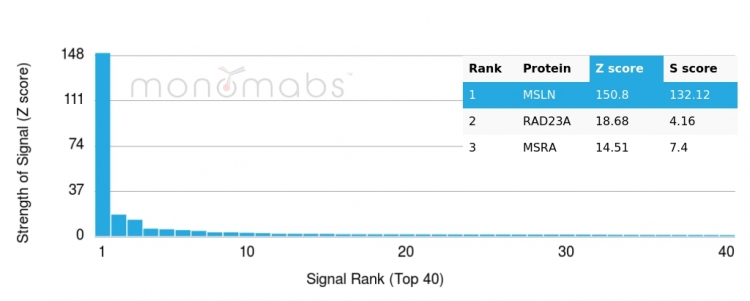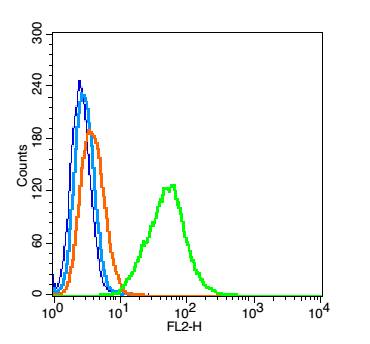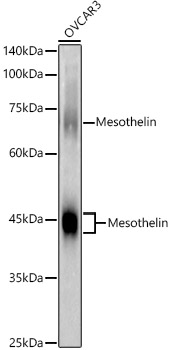![IHC-P analysis of human tonsil tissue using GTX17953 Mesothelin antibody [MSLN/2131]. IHC-P analysis of human tonsil tissue using GTX17953 Mesothelin antibody [MSLN/2131].](https://www.genetex.com/upload/website/prouct_img/normal/GTX17953/GTX17953_20200115_IHC-P_1385_w_23060620_106.webp)
IHC-P analysis of human tonsil tissue using GTX17953 Mesothelin antibody [MSLN/2131].
Mesothelin antibody [MSLN/2131]
GTX17953
ApplicationsImmunoHistoChemistry, ImmunoHistoChemistry Paraffin, Other Application
Product group Antibodies
ReactivityHuman, Mouse, Rat
TargetMSLN
Overview
- SupplierGeneTex
- Product NameMesothelin antibody [MSLN/2131]
- Delivery Days Customer9
- Application Supplier NoteIHC-P: 1-2microg/ml for 30 minutes at RT. *Optimal dilutions/concentrations should be determined by the researcher.Not tested in other applications.
- ApplicationsImmunoHistoChemistry, ImmunoHistoChemistry Paraffin, Other Application
- CertificationResearch Use Only
- ClonalityMonoclonal
- Clone IDMSLN/2131
- Concentration0.2 mg/ml
- ConjugateUnconjugated
- Gene ID10232
- Target nameMSLN
- Target descriptionmesothelin
- Target synonymsMPF, SMRP, mesothelin, CAK1 antigen, megakaryocyte potentiating factor, pre-pro-megakaryocyte-potentiating factor, soluble MPF mesothelin related protein
- HostMouse
- IsotypeIgG2b
- Protein IDQ13421
- Protein NameMesothelin
- Scientific DescriptionThis gene encodes a preproprotein that is proteolytically processed to generate two protein products, megakaryocyte potentiating factor and mesothelin. Megakaryocyte potentiating factor functions as a cytokine that can stimulate colony formation of bone marrow megakaryocytes. Mesothelin is a glycosylphosphatidylinositol-anchored cell-surface protein that may function as a cell adhesion protein. This protein is overexpressed in epithelial mesotheliomas, ovarian cancers and in specific squamous cell carcinomas. Alternative splicing results in multiple transcript variants, at least one of which encodes an isoform that is proteolytically processed. [provided by RefSeq, Feb 2016]
- ReactivityHuman, Mouse, Rat
- Storage Instruction-20°C or -80°C,2°C to 8°C
- UNSPSC12352203

![IHC-P analysis of rat stomach tissue using GTX17953 Mesothelin antibody [MSLN/2131]. IHC-P analysis of rat stomach tissue using GTX17953 Mesothelin antibody [MSLN/2131].](https://www.genetex.com/upload/website/prouct_img/normal/GTX17953/GTX17953_20200115_IHC-P_1815_w_23060620_464.webp)
![IHC-P analysis of mouse lung tissue using GTX17953 Mesothelin antibody [MSLN/2131]. IHC-P analysis of mouse lung tissue using GTX17953 Mesothelin antibody [MSLN/2131].](https://www.genetex.com/upload/website/prouct_img/normal/GTX17953/GTX17953_20200115_IHC-P_1625_w_23060620_144.webp)

![IHC-P analysis of human lung mesothelioma tissue using GTX17953 Mesothelin antibody [MSLN/2131]. IHC-P analysis of human lung mesothelioma tissue using GTX17953 Mesothelin antibody [MSLN/2131].](https://www.genetex.com/upload/website/prouct_img/normal/GTX17953/GTX17953_20200115_IHC-P_695_w_23060620_715.webp)
![IHC-P analysis of human endometrial carcinoma tissue using GTX17953 Mesothelin antibody [MSLN/2131]. IHC-P analysis of human endometrial carcinoma tissue using GTX17953 Mesothelin antibody [MSLN/2131].](https://www.genetex.com/upload/website/prouct_img/normal/GTX17953/GTX17953_20200115_IHC-P_540_w_23060620_906.webp)

![IHC-P analysis of human tonsil tissue section using GTX02676 Mesothelin antibody [TCL1/2747R].](https://www.genetex.com/upload/website/prouct_img/normal/GTX02676/GTX02676_20210319_IHC-P_w_23053122_633.webp)
![IHC-P analysis of human breast adenoid cystic carcinoma (ACC) tissue using GTX04373 Mesothelin antibody [MSVA-235M] HistoMAX?. Adenoid cystic breast cancer with strong membranous mesothelin immunostaining in a subset of cells.](https://www.genetex.com/upload/website/prouct_img/normal/GTX04373/GTX04373_20230728_IHC-P_77_23072722_210.webp)



